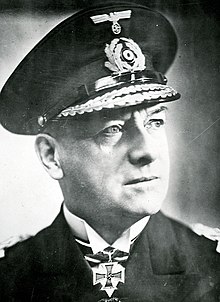Erich Raeder
German admiral (1876–1960)
Erich Johann Albert Raeder (April 24, 1876 – November 6, 1960) was a naval leader in Germany before and during World War II. Raeder attained the highest possible naval rank – that of Großadmiral (Grand Admiral) – in 1939, becoming the first person to hold that rank since Alfred von Tirpitz. Raeder led the Kriegsmarine (German Navy) for the first half of World War II, but resigned in 1943 and was replaced by Karl Dönitz. He was sentenced to life in prison at the Nuremberg Trials, but was released on September 26, 1955 and later wrote an autobiography, Mein Leben, in 1957. Erich Raeder died in Kiel, on November 6, 1960.

| This article about a person or group of people is a stub. You can help out with Wikiquote by expanding it! |
Quotes
edit- Reichskanzler Adolf Hitler had made the clear political request to build up for him in 5 years, that is, by the first of April 1938, armed forces which he could place in the balance as an instrument of political power.
- History of the War Organization and the Scheme for Mobilization, quoted during the Nuremberg trials as [Document C-135]
- National Socialism, which originates from the spirit of the German fighting soldier, has been chosen by the German people as its ideology. The German people follow the symbols of its regeneration with the same great love and fanatical passion. The German people has had practical experience of National Socialism and it has not been imposed, as so many outside critics believe. The Fuehrer has shown his people that in the National Socialist racial community lies the greatest and invincible sources of strength, whose dynamic power ensures not only peace at home, but also enables to make use of all the Nation's creative powers.
- This is the reason for the clear and unsparing summons to fight Bolshevism and international Jewry, whose race-destroying activities we have sufficiently experienced on our own people. Therefore, the alliance with all similar-minded Nations who, like Germany, are not willing to allow their strength, dedicated to construction and peaceful work at home, to be disrupted by alien ideologies as by parasites of a foreign race.
- If later on we instruct in the technical handling of weapons, this task demands that the young soldier should also be taught National Socialist ideology and the problems of life. This part of the task, which becomes for us both a duty of honor and a demand which cannot be refused, can and will be carried out if we stand shoulder to shoulder and in sincere comradeship to the Party and its organization. The armed forces and the Party thus became more and more united in attitude and spirit.
- Speech made for the German Heroes' Day, March 12, 1939.
- ...the basic principles of the military services are unchangeable. Courage and candor, obedience and comradeship, love of fatherland and loyalty to the State: these are ever the distinguishing characteristics of the soldier and sailor. Building character through intelligent training and education is always the first and greatest goal.
- Quoted in "He Led Hitler's Navy," "New York Times" article, April 24, 1960.
- ...to protect our position in the Norwegian and Arctic areas by threatening the flank of enemy operations against the northern Norwegian areas, and by attacking White Sea convoys...to tie down enemy forces in the Atlantic, so that they cannot operate in the Mediterranean, the Indian Ocean or the Pacific.
- Quoted in Peter Charles Smith, The Great Ships Pass: British Battleships at War (1977).
- All wars will be settled by sea power.
- In Forrest Davis, "The Atlantic System: The Story of Anglo-American Control of the Seas" (1941), p. 221.
Quotes about Raeder
edit- Hitler might have accepted his military leaders' advice (notably that of Admiral Raeder) and focused his attention on winning the war in the Mediterranean in 1941, before invading the Soviet Union. He might, for example, have struck across the Eastern Mediterranean to Cyprus, Lebanon and Syria; or through Turkey (violating her neutrality) towards the Caucasus; or across Egypt to Suez and beyond. Even as it was, the British positions in Malta and Egypt were acutely vulnerable. Rommel might well have been able to drive the British out of Egypt if he had been sent the twenty-nine German divisions that were sitting more or less idle in Western Europe. Alternatively, Hitler might have diverted more resources into winning the Battle of the Atlantic in 1942. Certainly, the German submarines were inflicting severe losses on Allied shipping throughout 1942 and into the spring of 1943.
- Niall Ferguson, The War of the World: Twentieth-Century Conflict and the Descent of the West (2006), p. xliii